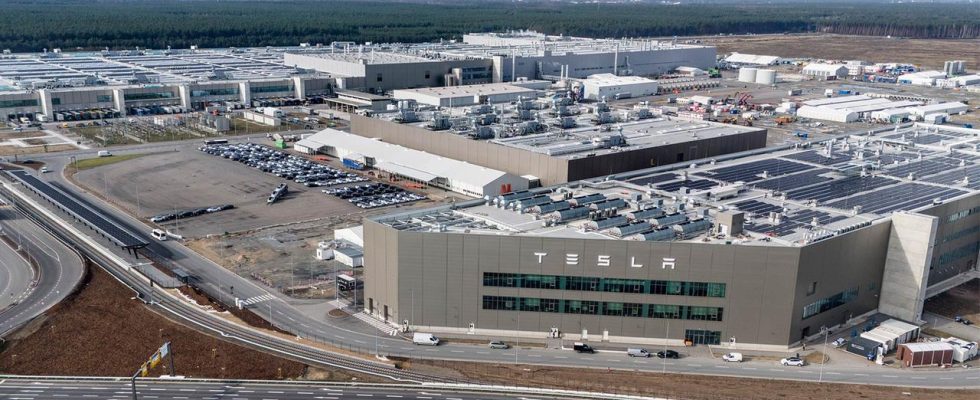faq
Production is still at a standstill at the Tesla factory in Grünheide. What were the consequences of the recent arson attack on a power pole? Why is the work so controversial? A demonstration is planned for today.
What’s planned today?
A demonstration against the expansion of the plant is planned this afternoon at the Tesla factory site in Grünheide, Brandenburg, southeast of Berlin. An “Alliance for Water Protection and Mobility Transition” has called for this. Previously, in a local citizen survey, around two thirds voted against the planned expansion, including a freight station and a warehouse. However, the vote is not binding.
What is the situation after the arson attack?
Last Tuesday, unknown people carried out an arson attack on a power pole, which led to a loss of production at the Tesla factory. The authorities classify a letter of responsibility from the left-wing extremist “Vulkan Group” as genuine. Tesla recently announced that production in Grünheide would probably be suspended until the end of next week.
Initially, the Frankfurt (Oder) public prosecutor’s office began investigations into unconstitutional sabotage, disruption of public operations and arson. The Federal Prosecutor General has now taken over the proceedings. Among other things, there is initial suspicion of membership in a terrorist organization.
What reactions have there been to this?
Politicians have sharply criticized the attack. Federal Interior Minister Nancy Faeser spoke out in favor of taking tough action against left-wing extremists. Tesla boss Elon Musk called the perpetrators “either the stupidest eco-terrorists in the world” or “puppets of those who don’t have good environmental goals.” Environmental activists have also clearly distanced themselves from the attack. Heidemarie Schroeder from the Berlin-Brandenburg water board told the “Berliner Zeitung” that a violent reaction to the dispute over the Tesla factory was “the wrongest thing that could be done.”
According to the electricity network operator Edis, security precautions have been increased on the site around the damaged electricity pylon. The area will be fenced off so that only specialist personnel have access. According to the energy company, the deployment of a security service and a continuous police patrol are also planned.
Why is the damage to Tesla so high?
Tesla factory manager Andre Thierig spoke of economic damage “in the high nine-figure range” due to the stop in production. The company is now unable to produce more than 1,000 vehicles per day. The manufacturer sells the models starting at a price of around 45,000 euros.
But it’s not just the loss of sales due to electric cars not being produced that is putting a strain on the manufacturer. Industry experts consider the loss of production to be problematic, especially in the bodyshell. Tesla may have to scrap numerous car bodies that got stuck during painting or in the anti-corrosion bath. After a power outage, robots in production also have to be completely repositioned.
How important is Grünheide for the US company?
Tesla has been producing electric cars for the European market in Grünheide since March 2022. The factory there is the first Tesla factory in Europe and was already highly controversial when it was being planned.
As the fourth of Tesla’s five “Gigafactories” to date, Grünheide produced an estimated 200,000 compact Model Y vehicles last year with around 11,000 employees. This meant that electric car production was still just below that of the Volkswagen plant in Zwickau, but significantly higher than that of the BMW plant in Leipzig.
In view of Tesla’s total sales of 1.8 million pure electric cars in 2023, the location already occupies an important position in the group’s production network. According to current plans, the Model 3 will also be built in the factory in the future.
The current total capacity of the site, which has cost around 5.8 billion euros to build, was recently estimated at around 500,000 vehicles. According to Tesla, further expansion of the factory should enable a capacity of one million electric cars per year. At the moment, however, the shortage of skilled workers in particular seems to be slowing down the expansion of production.
Last year, Tesla abandoned its original plan to produce complete batteries in Grünheide, apparently also because of criticism of the enormous water requirements for battery production.
What conflicts exist regarding environmental issues?
Since planning began at the end of 2019, environmentalists and nature conservationists have expressed considerable concerns about the construction of the large-scale factory. On the one hand, the necessary clearing of the pine forest for the 300-hectare factory site was criticized. The cleared area is to be compensated for by reforestation elsewhere, although this will take decades.
However, critics see the greatest risks in the Gigafactory’s water consumption, especially since part of the factory site is in a water protection area. There are fears that the plant will pollute the groundwater and endanger the drinking water supply. Tesla then reduced the forecast water consumption for the first expansion stage from a maximum of 3.3 million to around 1.4 million cubic meters per year. The effects on the water supply remain controversial, even among experts.
Most recently, dozens of environmental activists protested in a nearby forest against the planned expansion of the site by 120 hectares.
What conflicts exist in labor issues?
In principle, Tesla is at loggerheads with the IG Metall union in Germany because the company rejects collective bargaining and has so far been able to avoid co-determination by the works council under German law by choosing the legal form of a European stock corporation (Societas Europaea, SE).
In the fall, a media report about a striking number of work accidents among employees working in three shifts caused a sensation. Tesla, on the other hand, rejected IG Metall’s allegations that there was a lack of occupational safety in Grünheide as incorrect.
With information from Detlev Landmesser, ARD financial editorial team.

